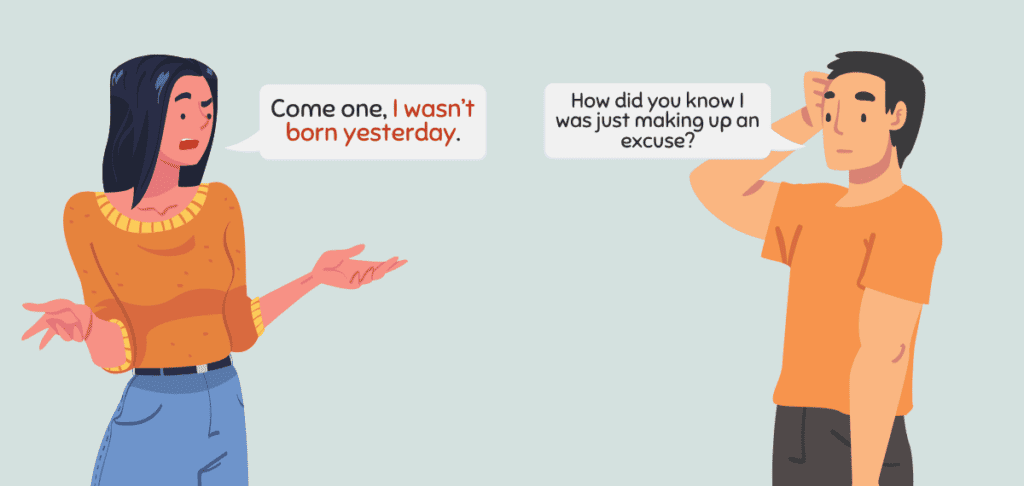I wasn’t born yesterday is an idiom that essentially means someone isn’t easily fooled or deceived. In other words, they’re savvy and can’t be easily taken advantage of. Imagine your child trying to pull a fast one, claiming they’ve brushed their teeth, but you haven’t heard the sink once. You might say, “You think I was born yesterday? I already checked your toothbrush.”
Idioms, like this one, are the vibrant threads in the fabric of language. They’re not just words but expressions packed with history, culture, and context. These phrases go beyond their literal meanings, painting vivid imagery or offering sharp insights. In the vast world of English, idioms play a crucial role, adding depth and color to our conversations.
Curious about the story behind I wasn’t born yesterday and how to weave it seamlessly into your chats? Stick around and dive into its rich history, definition, and illustrative examples.
What Is the Meaning of ‘I Wasn’t Born Yesterday’?

Saying “I wasn’t born yesterday” is a way of asserting that someone isn’t naive or easily fooled. It means they have enough experience and wisdom to see through deceptions or false stories. This phrase is used when there’s doubt about what someone is saying or doing.
For example:
- My students constantly try to use poor internet as an excuse, but I wasn’t born yesterday; their browsing history on the school computers says otherwise.
- When the hostess told me there weren’t any tables available, I had to point out I wasn’t born yesterday and showed her the restaurant’s app that provided open seating.
- He tried to sell me a ‘brand new’ phone that clearly had scratches all over it. I told him, “I wasn’t born yesterday; give me one that’s actually new.”
- When she said she’d never been to that café before, yet the barista greeted her by name and knew her regular order, I thought, “Really? I wasn’t born yesterday.”
- They promised the project would be done in just one day, but considering the scope of the work, I said, “I wasn’t born yesterday; give me a realistic timeline.”
I Wasn’t Born Yesterday Origin

You might wonder where the saying “I wasn’t born yesterday” comes from. Well, its exact roots are a bit hazy, but we know it started popping up in the 1800s. Some folks believe it’s a fancier way of saying “with age comes wisdom,” a sentiment beautifully put by the famous British writer, Oscar Wilde, back in the 19th century.
The phrase also got a spotlight in America when a Broadway play named “Born Yesterday” hit the stage in 1946. The story? It’s about a seemingly naive young woman who, as it turns out, is way sharper than people think.
Let’s Review
The origins of “I wasn’t born yesterday” and “you think I was born yesterday” might be a tad mysterious, but these sayings have been around since the mid-1800s, at least. While some believe it’s inspired by Oscar Wilde’s wise words about age bringing wisdom, the essence of the phrase is clear: it’s a way to let someone know you’re not easily fooled. So, if anyone tries to pull a fast one, you can confidently tell them you weren’t, in fact, born yesterday.
Check out some others we covered:
